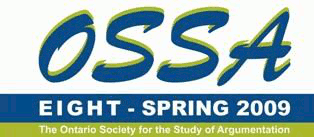
Location
University of Windsor
Document Type
Paper
Start Date
3-6-2009 9:00 AM
End Date
6-6-2009 5:00 PM
Abstract
The central supposition of the sceptical controversy regarding rationality in the theory of argumentation is that either there are universal standards against which the reasonableness of arguments can be evaluate or, conversely, that there are no determinate standards against which arguments can be evaluated, and hence no methods by which disputes can be rationally resolved. The paper argues that the basic terms of this debate are erroneously defined and that there is a middle path in this sceptical controversy. The paper adopts the later Wittgensteinian approach to language and applies it to the concept of rationality. Furthermore, it maintains that the search for universal standards of reasonableness in theories of argumentation is likely to come to naught, and that, nonetheless, there are discoverable methods by which arguments are evaluated, facts constituted, and disputes resolved.
Creative Commons License

This work is licensed under a Creative Commons Attribution 4.0 International License.
Response to Submission
Andrew Aberdein, Commentary on Schwed
Reader's Reactions
Andrew Aberdein, Commentary on Schwed (June 2009)
A Wittgensteinian Approach to Rationality in Argumentation
University of Windsor
The central supposition of the sceptical controversy regarding rationality in the theory of argumentation is that either there are universal standards against which the reasonableness of arguments can be evaluate or, conversely, that there are no determinate standards against which arguments can be evaluated, and hence no methods by which disputes can be rationally resolved. The paper argues that the basic terms of this debate are erroneously defined and that there is a middle path in this sceptical controversy. The paper adopts the later Wittgensteinian approach to language and applies it to the concept of rationality. Furthermore, it maintains that the search for universal standards of reasonableness in theories of argumentation is likely to come to naught, and that, nonetheless, there are discoverable methods by which arguments are evaluated, facts constituted, and disputes resolved.

